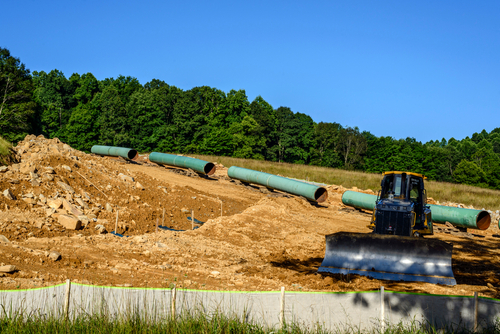
The controversial, under-construction Mountain Valley Pipeline — which upon completion will deliver natural gas from Pennsylvania, Ohio, and West Virginia to the Carolinas — would be finished “expeditiously” under an amendment introduced on Thursday by U.S. Rep. Carol Miller (R-WV).
“The Mountain Valley Pipeline is crucial to American energy independence,” Miller said in a March 23 statement. “All gas from the Mountain Valley Pipeline will supply domestic energy markets, meaning lower energy prices across the country as supply will dramatically increase.”
Miller’s Amendment No. 36 was made to the Republican-led Lower Energy Costs Act, H.R. 1, the energy package introduced earlier this month in the U.S. House of Representatives.
If enacted, the amendment would ensure that the Mountain Valley Pipeline, which is currently 94 percent completed, would be finished in mere months to deliver natural gas to North Carolina and South Carolina, increasing domestic energy supply and decreasing energy costs for all Americans, according to a bill summary provided by the congresswoman’s office.
Once completed, the pipeline is expected to provide up to two billion cubic feet per day of natural gas from the Marcellus and Utica shale formations to consumers in the Carolinas. Miller says the pipeline also would sustain about 5,800 jobs and $5.9 billion in economic activity in West Virginia and Virginia.
The Mountain Valley Pipeline will be governed by the federal Natural Gas Act, which requires a Certificate of Convenience and Necessity from the Federal Energy Regulatory Commission (FERC). The pipeline received its certificate on Oct. 13, 2017 and construction activities began in early 2018.
Since then, however, the delayed fracked gas pipeline has been strangled and held up by several court cases along the East Coast.
To get around them and fast track construction, Miller’s amendment states that for any project that, prior to Jan. 1, 2018, has been granted a certificate of public convenience and necessity by FERC under the Natural Gas Act, and which is still in effect, “shall be constructed expeditiously in the location and form specified in such certificate of public convenience and necessity.”
Additionally, such certificate of public convenience and necessity and any amendment, extension of time, or other authorization issued by a federal agency or state administrative agency for such project “shall not be subject to judicial review in any court, and any action (including any action pending in a court as of the date of enactment of this section) seeking judicial review of such an agency order or action shall not be filed or maintained in any court and shall be promptly dismissed,” the amendment says.
“Numerous natural gas permitting projects are being held up by a left wing, radical court that should have no jurisdiction over our natural gas,” Miller said. “My amendment helps complete many America First projects, like the Mountain Valley Pipeline, and implements a necessary check on the liberal court who wants to stop energy production.”
Her amendment is backed by 10 other Republican cosponsors, including several in Pennsylvania: U.S. Reps. Guy Reschenthaler (R-PA), Lloyd Smucker (R-PA), Daniel Meuser (R-PA), and Mike Kelly (R-PA).
The larger bill, H.R. 1, which U.S. Rep. Steve Scalise (R-LA) sponsored on March 14 alongside three original cosponsors, is crafted to lower energy costs by increasing American energy production, exports, infrastructure, and critical minerals processing; by promoting transparency, accountability, permitting, and production of American resources; and by improving water quality certification and energy projects, according to the text of the bill.
Currently, H.R. 1 has 42 Republican cosponsors, including Meuser and U.S. Reps. John Joyce (R-PA) and Glenn “GT” Thompson (R-PA). The bill remains under consideration in several House subcommittees.
According to H.R. 1 opposition, the bill is nothing more than an attempt by the GOP to erase the Biden administration’s climate agenda and Democrats said this week that that’s not going to happen.
U.S. Senate Majority Leader Chuck Schumer (D-NY) on March 21 spoke on the Senate floor regarding H.R. 1, and sent supporters of the bill a clear message from the upper chamber: “You can do all the hoopla you want in the House, it ain’t passing.”
“I have been very clear about two things: Democrats want to see a bipartisan, common-sense energy proposal come together in Congress, but Republicans’ H.R. 1 proposal is dead on arrival in the Senate,” Schumer said.